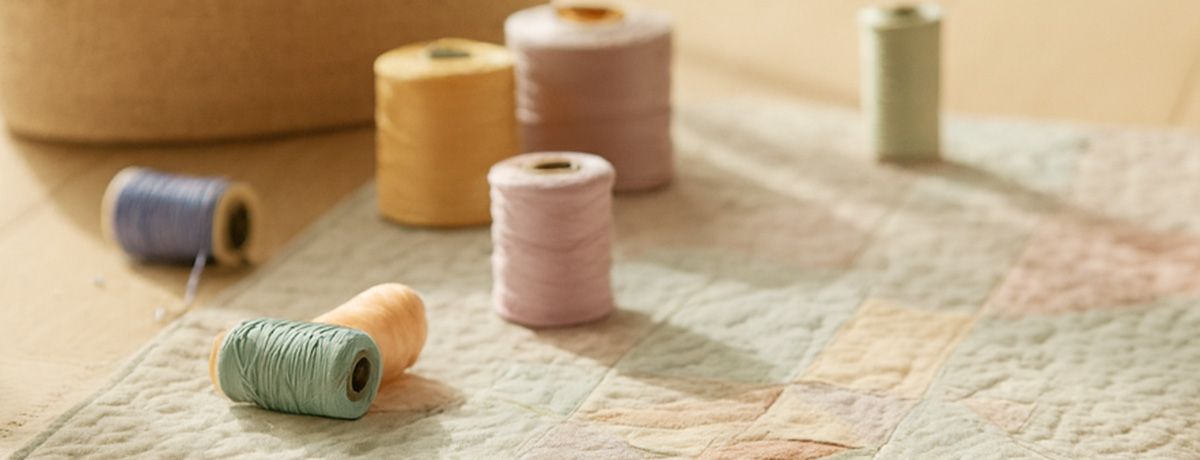100% Cotton Thread for Quilting: A Professional Guide

Quality materials form the foundation of successful quilting projects. Among these materials, 100% cotton thread stands out as an essential component that directly impacts the durability, appearance, and longevity of finished quilts. Understanding the properties and applications of cotton quilting thread enables manufacturers and wholesale buyers to make informed sourcing decisions that align with their production requirements.
With a wide range of options available, you can easily find the perfect 100% cotton thread to suit your specific quilting needs, whether you require strength, color variety, or specialty finishes.
This guide examines the critical aspects of 100% cotton thread for quilting, from understanding thread quality indicators to selecting appropriate specifications for different applications.
Understanding Thread Quality
Thread quality determines both the manufacturing efficiency and the final product outcome. Professional quilters trust excellent cotton threads for their durability and high performance. Several factors distinguish premium cotton threads from standard alternatives.
Mercerization Process
Mercerization is one of several finishing techniques used to enhance the quality of cotton threads. This process adds to the thread’s color retention and smoothness by strengthening the fiber, improving dye absorption, and creating a smoother surface finish. The treatment improves the smoothness of the thread surface, resulting in threads with superior color retention and reduced lint production during high-speed sewing operations.
Staple Length Classification
Extra-long staple cotton, such as premium Egyptian-grown varieties, is a superior fiber used in high-quality threads. The longer fibers create fewer weak points in the finished thread, resulting in a stronger thread that resists breakage during machine quilting operations. The use of extra-long staple cotton produces strong threads that are ideal for quilting and deliver consistent performance across various quilting applications.
Manufacturing Techniques
Advanced spinning and twisting methods significantly impact thread performance. Precision manufacturing processes create uniform thread diameter, balanced tension properties, and optimal twist levels. These characteristics contribute to smooth feeding through machine tension discs and needle eyes, minimizing production interruptions.
Selecting the Right Thread Specifications
Thread selection requires careful consideration of multiple technical parameters to match specific production requirements. Choosing the perfect thread is essential for achieving the best results in quilting projects.
Weight Classifications
Thread weight indicates the diameter and density of the strand. Common quilting weights include:
40 wt cotton thread: Suitable for general quilting applications on home machines and provides visible stitching with good coverage.
50 wt cotton thread: Offers finer stitching lines, ideal for detailed quilting patterns and delicate fabrics. Compatible with both domestic and longarm quilting machines.
Weight selection impacts stitch visibility, fabric compatibility, and overall aesthetic outcomes.
Color Options
Cotton threads are available in extensive color ranges to meet diverse design requirements. Solid colors provide consistent appearance throughout projects, while variegated threads create visual interest through gradual color transitions along the strand. Subtle shade variations allow for sophisticated tonal effects in quilting designs.
Application Compatibility
Different quilting techniques demand specific thread characteristics. Machine quilting requires threads with smooth finishes that minimize friction and lint accumulation. Hand quilting applications benefit from threads with slight texture for improved grip. Embroidery applications may require specialized cotton threads with enhanced sheen properties.
Working with Cotton Quilting Threads
Successful thread usage depends on understanding handling requirements and optimal working conditions.
Machine Setup Considerations
Proper tension adjustment ensures balanced stitches without puckering or thread breakage. This is especially important when using longarm machines for quilting with cotton threads, as proper tension helps achieve optimal stitch quality. Cotton threads typically require slightly lower tension settings compared to polyester alternatives due to their natural elasticity properties. Regular needle replacement prevents thread shredding caused by burrs or heat damage.
Stitch Quality Optimization
Smooth, mercerized 100% cotton threads reduce friction during high-speed quilting operations. This characteristic minimizes heat buildup in the needle, extending equipment life and maintaining consistent stitch formation. The natural breathability of cotton fibers also reduces static electricity accumulation during production runs.
Design Implementation
Cotton threads enable precise execution of intricate quilting patterns. The thread's natural properties allow for tight curves, detailed stippling, and complex geometric designs without compromising structural integrity. Color selection and weight specifications can emphasize or blend quilting lines according to design intent.
Sourcing 100% Cotton Thread for Production
Wholesale buyers and manufacturers require reliable suppliers who deliver consistent quality and technical support.
MH serves as a professional wholesale supplier of garment accessories and fabrics from China, specializing in high-quality cotton threads for quilting applications. The company focuses exclusively on wholesale partnerships, not retail distribution, ensuring competitive pricing structures and bulk availability for production requirements.
MH maintains rigorous quality control standards across its cotton thread product lines, offering various weights, colors, and specifications to meet diverse manufacturing needs. The company's reliability and consistent quality have established long-term partnerships in the global textile market.
Manufacturers seeking dependable sources for 100 cotton quilting thread can benefit from MH's technical expertise and extensive product range, which includes mercerized cotton threads, extra-long staple options, and specialty variegated colors suitable for various quilting applications.
Ensuring Long-Term Performance
100% cotton thread selection directly influences product durability and customer satisfaction. Premium cotton threads withstand repeated washing cycles, maintain color vibrancy, and provide structural integrity throughout the quilt's lifespan. These performance characteristics translate into reduced warranty claims and enhanced brand reputation for manufacturers.
Investing in quality cotton threads optimizes production efficiency through reduced thread breaks, minimized machine downtime, and consistent stitch formation. These operational advantages offset material cost differences while improving overall profitability.
For wholesale buyers and manufacturers prioritizing quality outcomes, 100% cotton thread represents a strategic material choice that supports both production efficiency and finished product excellence.


